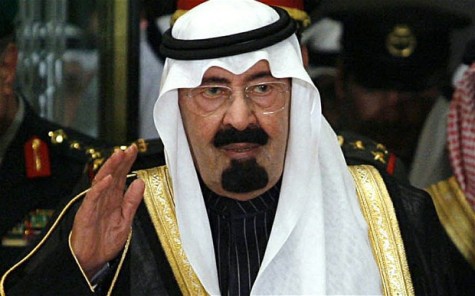King Abdullah of Saudi Arabia has ordered the establishment of a committee to prepare a list of Saudis who fight abroad or support extremist groups “financially or morally”.
Monday’s royal order includes those who support any illicit organization, from the Muslim Brotherhood to the Islamic State of Iraq and as-Sham, prominent in fighting in both Iraq and Syria.
Those found guilty could be punished from 3 to 20 years in prison.
Abdullah’s order follows weeks of publicity by pro-Government media outlets about Saudis who fight abroad. The discussion escalated after an anchor on the pro-Government outlet MBC TV named and denounced scholars for inciting Saudi youth to go to Syria.
One of the scholars, Salman Al-Ouda, has 4.3 million followers on Twitter. He denied participating in any incitement and challenged the anchor to prove the allegations.
MBC TV also asked about the activities of a Syrian scholar in the kingdom, Adnan al-Aroor. The Salafi cleric, originally from Hama, usually appears on anti–Shia channels and was already prominent in televised debates between Sunni and Shia before the start of the Syrian uprising in March 2011.
Al-Aroor replied that he had never asked Saudis to fight in Syria, although he called on people to donate and pray for the revolution.
After the broadcast on 19 January, many commentators saw the start of a regime campaign against clerics who do not follow the Government position towards local and regional issues. They noted the MBC Group is owned by Waleed Al Ibrahim, the brother-in-law to the late King Fahd.
The tensions include the billions of dollars given by the Saudi regime to the military in Egypt after its July 2013 coup, and the sympathies of some clerics for ISIS in Iraq and Syria.
In another episode the following week, the MBC anchor hosted three scholars who opposed the participation of Saudi youth in the Syrian conflict. The Islamic Affairs Ministry subsequently sent a memoradum to imams ordering them not to talk about jihad in Friday Prayer, and official scholars in institutions such as the Saudi Council of Senior Scholars reissued a fatwa prohibiting Saudis from fighting in Syria.
King Abdullah’s order and the official campaign appear to have a two-fold purpose. In the regime, they seek to curb the threat of ISIS, not only as a military force but as the claimed leader of a rival Islamic State. The fear of losing this primacy in the Sunni Islamic world also is behind the Kingdom’s support of General Abdel Fatteh al-Sisi as the de facto leader of the post-coup regime in Egypt.
Closer to home, the regime is now looking at “national security” in the context of Saudis who may return from the Syrian conflict to challenge the system, as some insurgents did following civil wars in Afghanistan and Iraq.

